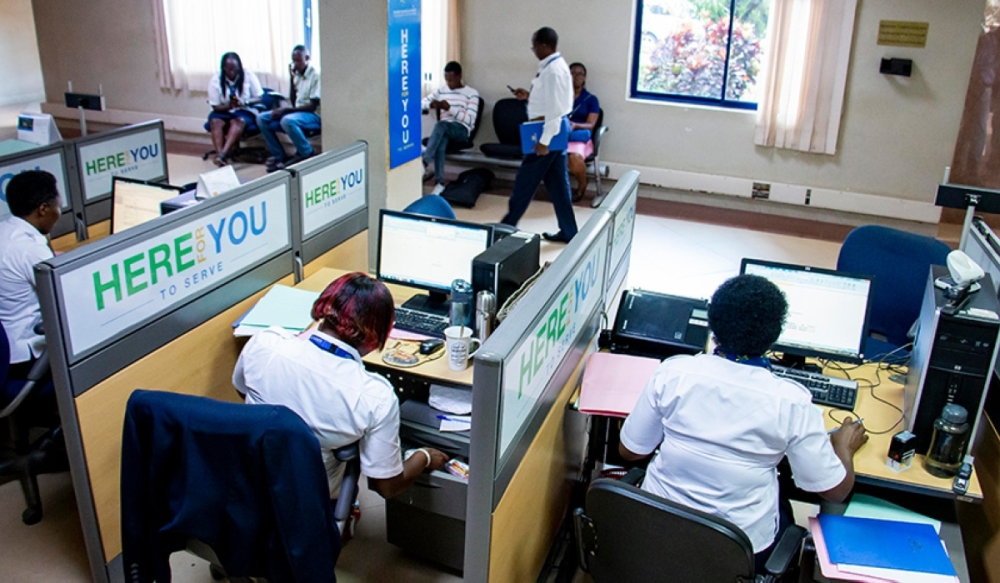

On January 26, Rwanda Revenue Authority (RRA) waived Rwf6.6 billion in penalties for 31,500 de-registered tax accounts.
A move triggered by quite a large number of taxpayers who requested to de-register their tax identification numbers (TINs) because they had incurred charges despite having done no business activity from the time they registered their businesses.
ALSO READ: RRA waives penalties for over 30,000 de-registered tax accounts
This was the case for Sheilla Ingabire, a student who registered a business in 2021 to start a cosmetic shop from a grant she had won but later failed to kick off because of family issues that demanded her attention.
"After some time I learnt that my tax account was still active and incurred charges. I severally attempted to de-register the business but I couldn’t do so without paying the penalty first,” she said, adding that the amount has risen to about three million.
ALSO READ: Four things you should know about the new tax reforms
RRA officials communicated that TINs that have never imported or exported, locally purchased or sold any goods and services shall be de-registered and be discharged of all penalties imposed by the tax system as they have never done any income-generating activity to pay taxes.
Jean-Paulin Uwitonze, Assistant Commissioner for Taxpayer Services and Communications at RRA, said that the analysis was carried out during a countrywide tour by RRA senior officials.
Technology was used to identify tax accounts to be de-registered and discharged of penalties by assessing if they exported or imported both goods and services as well as if they purchased or retailed any goods.
ALSO READ: A closer look at 2023’s tax changes: Five laws tailored to citizens’ needs
According to RRA taxation guidelines, tax declaration on annual revenue is a must for all registered taxpayers whether or not they made profits in the fiscal year under review. For those who don’t carry out any activity, they still have to declare nil-filing.
Nil-filing refers to inactive taxpayers who report zero on all fields of their tax declaration. Their presence in the tax registry can simply generate an administrative burden and confusion about the total number of actual taxpayers in the country.
Angello Musinguzi, Senior Manager, KPMG Rwanda, noted that there are various reasons why tax charges pile up on non-operational accounts, pointing out that some simply don’t do business or others open a business to compete in a tender and abandon it once it fails.
"When you register a business, it does not necessarily mean that you will start operating. Some even leave it completely or start after years. Either way, RRA will penalize your tax account for not declaring returns on business, even if no activity was done.”
The issue was that the revenue authority was accumulating tax revenues that are not collectible, he said, adding that people should be educated about taxation before registering a business or for RRA to freeze tax accounts that don’t submit zero-revenue declaration over some time.
ALSO READ: Rwanda Revenue Authority revenue collections up 10.8% as taxpayers' month kicks off
Fidel Ukwishaka, Tax Director at B-Kelana International, a tax advisory firm, said that this move should be considered as a chance to be seized quickly because in normal circumstances, they would have been penalized.
"Yes, the government is waiving a certain amount of revenue but it will lift off the burden on business people, especially small businesses so that they can potentially start over on a clean slate.”
According to him, non-operating TINs have been a big issue that developed from the fact that anyone from any given profession would just decide to register a company remotely, and in most cases, without thorough business assessment and commitment.
"Doing business in Rwanda is very easy and a good thing, however, people should understand that it comes with taxpayer obligations that should be upheld. Having many non-operating TINs would have caused chaos in RRA system,” Ukwishaka said.
A local businessman, Andre Bitwayiki, Founder of Matare Ltd, said that this shows flexibility to facilitate business growth in the market, adding that it serves as a lesson for business people to follow up and conduct proper business management.
According to him, some people would miss out on certain opportunities because they didn’t have a tax clearance certificate which is often requested by banks if one is seeking to acquire a loan.
No room for tax evasion
According to the experts, there should be no room for tax evasion throughout this process of waiving penalties and removing non-operational tax accounts, as well as de-registering businesses.
Ukwishaka noted that while some people might want to take advantage of the situation, RRA will need to deliberately scrutinize those requesting for the waiving of tax penalty.
The waived penalties also followed tax reforms that led to reduction of different taxes, including the exemption of Value Added Tax (VAT) on processed cereals such as maize flour and rice, as well as the decreasing corporate income tax statutory rate from 30 to 28 per cent.
Similarly, Musinguzi said that due to the current EBM technology, it is easy to trace business activities on TIN accounts, hence, hard for anyone to evade tax under the circumstances.
RRA announced that the declaration and trade licence tax period is January 31, 2024.


